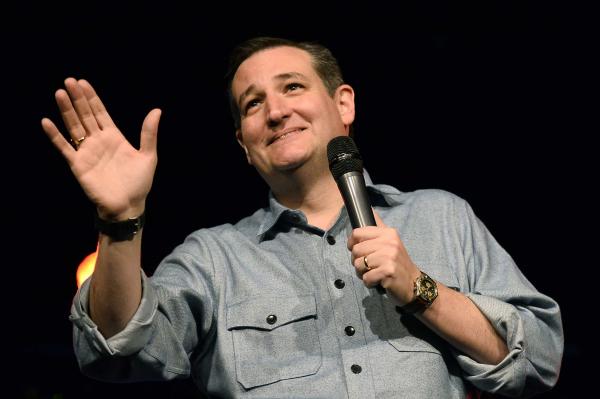
Republican presidential hopeful Sen. Ted Cruz (R-Texas) isn't happy with The Washington Post.
Well, Cruz specifically isn't happy with The Post's editorial staff, who published an editorial cartoon that showed Cruz dressed in a Santa Claus outfit as an organ grinder with a pair of monkeys ahead of him - whom the cartoon identifies as his children.
Cruz condemned The Washington Post for showing his daughters as monkeys in this way since he believes they should be off-limits, NBC News reported.
"Not too much ticks me off, but making fun of my girls, that'll do it," Cruz said about the cartoon, which The Post has taken down. "It used to be for a long time, the rules across the board, that kids are off-limits. That should be the rules. Don't mess with our kids. Don't mess with my kids. Don't mess with Marco's kids. Don't mess with Hillary's kid. Don't mess with anybody's kids. Leave kids alone. And if the media wants to attack and ridicule every Republican, well that's what they're gonna do. But leave our kids alone."
Cruz sent out an email appeal to his supporters asking them to help raise $1 million as a response to the cartoon, saying that his daughters were "NOT FAIR GAME!" as the cartoonist, Ann Telanes, said they were in the cartoonist's introduction.
Telanes drew the cartoon as a response to Cruz's own parody political advertisement in which his daughters, Caroline, 7, and Catherine, 5, read a version of "The Grinch Who Lost Her Emails," which many considered to be a reference to Hillary Clinton and her email scandal, Newsmax reported.
"There is an unspoken rule in editorial cartooning that a politician's children are off-limits," Telanes said while introducing the cartoon, Newsmax reported. "But when a politician uses his children as political props, as Ted Cruz recently did in his Christmas parody video in which his eldest daughter read (with her father's dramatic flourish) a passage of an edited Christmas classic, then I figure they are fair game."
But The Washington Post editor Fred Hiatt said he "failed to look at this cartoon before it was published" and disagreed with Telanes' view on the cartoon.
Normally, Hiatt said, The Post wouldn't publish anything about or against a candidate's children.
However, other candidates have drawn fire in recent weeks for including their children publicly in their campaigns.
In fact, earlier this week, Democratic candidate Hillary Clinton used her daughter's recent pregnancy as a way to earn some political points.
After her daughter Chelsea Clinton said she'd be having another baby, Clinton's campaign team published a list called "7 ways Hillary Clinton Is Just Like Your Abuela," which included points that were written in a mix of Spanish and English, serving as a way for her campaign team to reach out to Latino voters, The Huffington Post reported.
"And unsurprisingly, people on Twitter aren't too happy about it," The Huffington Post reported. "Shortly after, #NotMyAbuela began trending on Twitter and users called the move 'Hispandering' from Clinton's team."
The #NotMyAbuela trend included a number of reactions.
Of course, not all candidates this year have brought their families into the political foray. Republican candidate Donald Trump, for example, hasn't had his wife, Melania Trump, join him on the campaign trail often, mostly because Melania wants to stay home with their 9-year-old son, Barron, ABC News reported. It wasn't until late November that Melania joined The Donald on his campaign, albeit briefly.
Political candidates have often struggled to decide whether or not to include their families on campaign trails, mostly because they're weighing the options between privacy and their own political gain, The Hill reported.
For example, back during the 2008 presidential elections, President Barack Obama put his daughters in political advertisements and photos. But by 2012, Obama decided to limit how much he exposed his family to the media, The Hill reported.
"I don't think it's healthy, and it's something that we'll be avoiding in the future," Obama told reporters at the time.
Experts say this push-and-pull between family privacy and a politician's political gain started with the Kennedys, who would sometimes share pictures of their children to show they were a strong family, but then would push the media away to give their children privacy, The Hill reported.
Political campaign expert Ron Faucheux, a professor at George Washington University, told The Hill that most political families don't want their children to be included in the politics, but can't help the wants and desires of the voters.
"When you do see the families and kids in the campaign, I think oftentimes it's done because the campaign feels like the candidate needs to sell a human side, a family values side, personal warmth," Faucheux told The Hill. "And the people in the campaign sort of prevail on the candidate to include their family more often."
For more on Media
Steve Harvey got the Miss Universe winner's name wrong. Was it on purpose?
Deseret News heroes of 2015: 7 people who made a difference this year
The simple change you can make to your Facebook profile to strengthen your relationship

